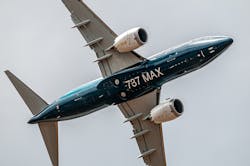House Panel Blames Boeing for 737 MAX Failures
A Congressional report blamed a series of design mistakes in the Boeing 737 MAX, as well as failure by the Federal Aviation Administration to properly oversee the aircraft's certification process, for two crashes that killed 346 passengers and crew members.
The twin-engine, narrow-body jet that Boeing introduced in 2017 has been idle since March 2019, though Boeing hopes to resume its 737 MAX deliveries later this year. Those deliveries, and the restoration of commercial services by various airlines, depend the satisfactory completion of several test flights now in progress, and the verification the reliability of new flight-control programming developed during the grounding period, as well as receipt of airworthiness certification from FAA and other air-safety regulating agencies.
The two crashes brought to light a controversial situation within the commercial aviation sector, involving the willingness of jet builders and regulators to expedite the process for certifying the air-worthiness of aircraft. Congressional oversight has raised questions about the initial certification of the 737 MAX, which in turn has raised tensions between Boeing and FAA over their respective claims in the matter.
The House Committee on Transportation and Infrastructure issued its 238-page report that largely blamed Boeing for the circumstances leading to the two plane crashes. The report, which was drafted by the Committee's Democrat majority members, said Boeing risked passengers' safety in pursuit of profit, and described the allegations that Boeing pressured its employees to expedite the 737 MAX design and certification process as evidence of "disturbing cultural issues". The report said Boeing employees' concerns about the aircraft's design were not adequately addressed.
Some Republican members of the committee claimed nonpartisan recommendations, "not a partisan investigative report," should be the basis for any Congressional action that may follow.
Some members of Congress have proposed new legislation to strengthen the FAA's oversight of commercial aircraft manufacturing. That effort, first reported in August, blamed FAA for failing to protect airline passengers when the agency delegated some critical certification steps to Boeing.
FAA has proposed two civil penalties and fines totaling $1.25 million for Boeing, in its own conclusion that Boeing put pressure on employees authorized to perform functions on behalf of the FAA, including inspecting aircraft and issuing airworthiness certificates.
Responding to the Congressional summary, the FAA said it is "committed to continually advancing aviation safety and looks forward to working with the Committee to implement improvements identified in its report."
